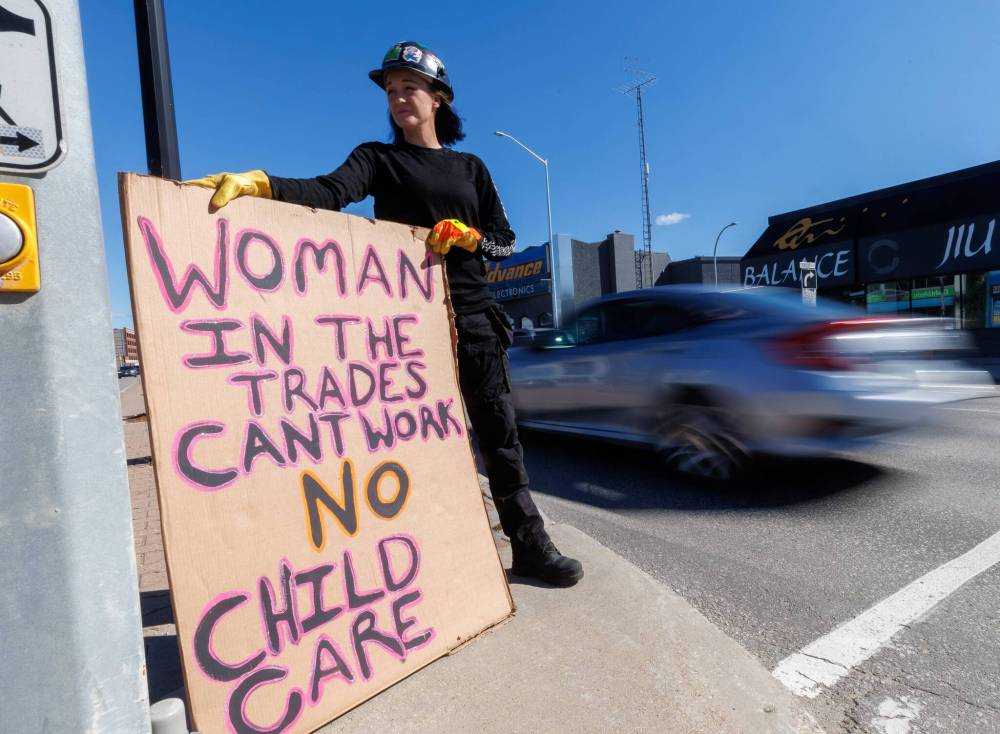
When Arleen Kehler decided she wanted to become a plumber, she quickly found success — the single mother of three received several scholarships and was even lauded as a “inspiration for other girls and women interested in the trades” in a profile from First Peoples Development Inc.
Today, she’s on social assistance and has to use food banks after she was forced to leave her job when she wasn’t able to get her children off a two-year wait list and into a school-age child-care program.
“I had to leave my position. It was heartbreaking, not only financially, but mentally as well, because I’ve worked my butt off for this,” she said.

Frustrated and with no recourse, Arlene Kehler has taken to holding one-person protests on Portage Avenue.
Kehler, 41, and her three children, ages 4, 7 and 9, moved to Winnipeg from Portage la Prairie in 2020. She was able to find spots for them at a child-care centre on St. Matthews Avenue, but then the family moved to Wolseley two years ago, and her two older children enrolled in school. She put them on waiting lists for a site closer to her and asked family members to watch them while she worked as a plumber for ServcoCanada.
Her shifts started hours before school did and could be as long as 12 hours, depending on the job. It quickly became impossible to make it though a full shift without having to pick up her children. Despite support from her employer, she had to resign.
“It just doesn’t make any sense for someone determined and passionate and ready to go to not be able to get there. Something is wrong,” she said.
Frustrated and with no recourse, Kehler has taken to holding one-woman protests on Portage Avenue. Decked out in her hard hat and work gear, she carries a sign reading: “Woman in the trades can’t work: No child care.”
“They want women in the trades,” she said. “Well, they want us there, we need child care, and that’s the bottom line.”
Manitoba has about 14,000 licensed spaces for school-age children (ages six to 12), and the system for kids over six is uniquely regulated compared with much of Canada, Manitoba Child Care Association executive director Jodie Kehl said.
It means the province’s agreement with the federal government to fund 23,000 new not-for-profit child-care spaces by 2026 is only for children up to six years old.
“The funding for school-age programs has to come out of the provincial coffers. … It only proportionally stands to reason that the school-age spaces have to also increase, so that those children, as they age out of pre-school programs, then continue care in a high-quality child care program,” she said.
Even families that receive care during the school year are often left without anywhere to go during school breaks and in-service days.
In many situations, a facility will have a set number of spaces designated for school-age kids, and it might not be as high the number of spaces for pre-school kids.
“What often happens in a program is that as children age out of the preschool program … there may not actually be a space available for them,” Kehl said.
Often, its working and single parents who are stuck.
“So even if (Kehler), this single mom, even if her employer perhaps doesn’t use child care for whatever reason, this employer is now impacted because she can no longer come to work. So, it does affect us all,” Kehl said.
The provincial government is on track to create more than 4,400 school-age spaces, but the level of need continues to grow as the population increases, Education and Early Childhood Learning Minister Nello Altomare said.
“We’re ready to partner with the federal government to include school-aged children,” he said. “That’s going to be something that I will bring up, and I’m sure other provinces have as well.”
He said discussions are underway with school divisions about how the province can help encourage students and faculty to receive training in early childhood education.
“What that looks like is people like (educational assistants) getting extra training they need so that they can become child-care workers. We can work with school divisions to provide some of that extra training so that we get this done,” he said.
malak.abas@freepress.mb.ca

Malak Abas
Reporter
Malak Abas is a city reporter at the Free Press. Born and raised in Winnipeg’s North End, she led the campus paper at the University of Manitoba before joining the Free Press in 2020. Read more about Malak.
Every piece of reporting Malak produces is reviewed by an editing team before it is posted online or published in print — part of the Free Press‘s tradition, since 1872, of producing reliable independent journalism. Read more about Free Press’s history and mandate, and learn how our newsroom operates.
Our newsroom depends on a growing audience of readers to power our journalism. If you are not a paid reader, please consider becoming a subscriber.
Our newsroom depends on its audience of readers to power our journalism. Thank you for your support.



